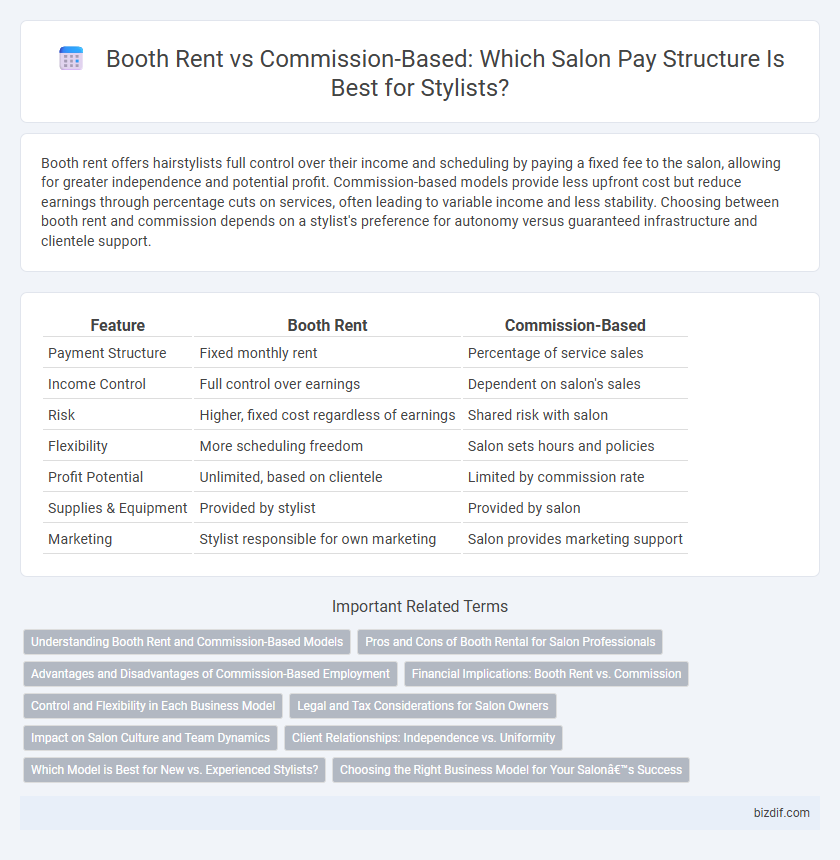Booth rent offers hairstylists full control over their income and scheduling by paying a fixed fee to the salon, allowing for greater independence and potential profit. Commission-based models provide less upfront cost but reduce earnings through percentage cuts on services, often leading to variable income and less stability. Choosing between booth rent and commission depends on a stylist's preference for autonomy versus guaranteed infrastructure and clientele support.
Table of Comparison
| Feature | Booth Rent | Commission-Based |
|---|---|---|
| Payment Structure | Fixed monthly rent | Percentage of service sales |
| Income Control | Full control over earnings | Dependent on salon's sales |
| Risk | Higher, fixed cost regardless of earnings | Shared risk with salon |
| Flexibility | More scheduling freedom | Salon sets hours and policies |
| Profit Potential | Unlimited, based on clientele | Limited by commission rate |
| Supplies & Equipment | Provided by stylist | Provided by salon |
| Marketing | Stylist responsible for own marketing | Salon provides marketing support |
Understanding Booth Rent and Commission-Based Models
Booth rent models in salons allow stylists to lease a space and keep 100% of their earnings, providing greater control over their income and schedule. Commission-based models involve stylists earning a percentage of the services they provide, with the salon managing bookings, supplies, and marketing in exchange for a portion of the revenue. Understanding these models helps stylists choose the best fit for their business goals, balancing financial stability and independence.
Pros and Cons of Booth Rental for Salon Professionals
Booth rental offers salon professionals independence and flexibility, allowing them to set their own schedules and retain 100% of their earnings, which can significantly increase income potential. However, renters face the responsibility of managing their own expenses, including supplies, taxes, and marketing, which may require strong business acumen. Unlike commission-based models where salons provide clients and overhead, booth rental demands proactive client acquisition and self-promotion to maintain consistent revenue.
Advantages and Disadvantages of Commission-Based Employment
Commission-based employment in salons offers stylists a steady income stream tied directly to their performance, motivating higher productivity and client retention. However, the downside includes unpredictable earnings and potential pressure to upsell services, which may affect client experience and stylist satisfaction. This model benefits salons by aligning stylist goals with business growth but requires careful management to balance incentives and quality service.
Financial Implications: Booth Rent vs. Commission
Booth rent in salons requires a fixed monthly fee, providing consistent expenses that simplify budgeting but demand steady client flow to ensure profitability. Commission-based models charge a percentage of stylists' earnings, creating variable costs that fluctuate with income and potentially reduce financial risk during slow periods. Stylists must evaluate their financial stability and client base to decide which payment structure aligns best with their earning patterns and risk tolerance.
Control and Flexibility in Each Business Model
Booth rent offers salon professionals full control over their schedule, services, and pricing, providing maximum flexibility to build their personal brand and client base without sharing a portion of their earnings. Commission-based models reduce financial risk for salon owners by providing structured income, but stylists have less autonomy, as they must adhere to salon pricing and schedules while sharing a percentage of their revenue. Choosing between booth rent and commission-based models depends on priorities for independence versus support, impacting overall control and day-to-day flexibility in salon operations.
Legal and Tax Considerations for Salon Owners
Salon owners must navigate distinct legal and tax implications when choosing between booth rent and commission-based models. Booth rental agreements typically classify stylists as independent contractors, affecting tax reporting and liability, whereas commission structures often establish an employer-employee relationship, subjecting owners to payroll taxes and labor laws. Understanding state-specific regulations and IRS guidelines ensures compliance and optimizes financial management within salon operations.
Impact on Salon Culture and Team Dynamics
Booth rent fosters entrepreneurial independence among stylists, encouraging personal brand development while potentially reducing team collaboration and shared responsibility for salon atmosphere. Commission-based models promote a cohesive team environment by aligning stylist success with salon performance, enhancing collective motivation and culture. Choosing the right compensation structure significantly influences staff interaction, morale, and ultimately the client experience within the salon.
Client Relationships: Independence vs. Uniformity
Booth rent allows salon professionals to maintain independence in managing client relationships, fostering personalized service and direct communication. Commission-based models promote uniformity in client experience through standardized protocols and salon policies, ensuring consistency across services. Choosing booth rent supports individualized client loyalty, while commission systems emphasize brand cohesion and operational control.
Which Model is Best for New vs. Experienced Stylists?
New stylists often benefit from commission-based models as they receive support, steady clientele development, and less upfront financial risk, allowing them to build skills and reputation. Experienced stylists typically prefer booth rent for greater autonomy, higher earning potential, and control over their schedule, making it ideal for those with established client bases. Assessing income stability, growth goals, and business acumen helps determine the best fit between booth rent and commission-based arrangements.
Choosing the Right Business Model for Your Salon’s Success
Choosing between booth rent and commission-based models significantly impacts a salon's profitability and stylistic culture. Booth rent offers stylist independence and steady income, attracting entrepreneurial professionals, whereas commission-based models promote team collaboration and allow salons to control pricing and service quality, influencing customer satisfaction. Analyzing local market trends, stylist experience levels, and financial goals guides salon owners in selecting a business model that maximizes revenue while fostering a thriving work environment.
Booth Rent vs Commission-Based Infographic

 bizdif.com
bizdif.com